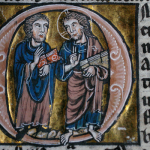EXCHANGE ON FAITH AND REASON: Between me and reader Eric Enlow. He’s in bold, I’m in plain text. Sorry it’s so long and my last reply is so disorganized–I think I said some worthwhile stuff but it’s not exactly crisp and tightly-structured.
Him: I enjoyed your remarks on God and Reason. But you misquote the First Epistle of Peter in a telling way. Peter admonished us to give an account of the HOPE, not the faith within us. If he had said faith (with its connotations of doctrine in some camps), perhaps we could read him as urging philosophical apologetics.
But a better reading is that Peter calls us, specifically in the context of times of persecution, not to provide a logical proof of the contents of our faith, but to explain (“in meekness and fear” which are not the usual adjectives for rational argument) why we do not despair. The emphasis is not on the rational exegesis of the grounds of our belief, but on individual’s personal testimony of Christ as a source of Hope even in the teeth of martyrdom. Our confidence in Christ’s love for us is the reason we have hope, not some set of philosophical proofs in an unmoved mover.
Additionally, to put it bluntly, I cannot find any content in your proposed distinction between the suprarational and the irrational that would save you from calling faith irraitonal. All things are either rational or irrational, just like all things are either triangular or not triangular. The suprarational may be a subset of the irrational but it is still irrational. Nor do I understand how the postulated unity between being, goodness, unity and beauty will help you reconcile faith and human reason. To the contrary, the great chain of being proposed by Plato (and in one form or another by all humanistic thinkers) opposes itself to the contents of Christian revelation, where divine being stands opposed to created being — where the whole drama of Incarnation derives from the surmounting of the insurmountable barriers between divine and created. Similarly, the eternal universe of Aristole stands completely opposed to the created universe of Genesis. The lesson of being that we derive from humanistic philosophy is, not surpisingly, that we are linked to divinity, that we are fundamentally one with Being, that we are a part of what has always been and always will be. The lesson of being that we derive from revelation is that we are cut off from Being and can only be rejoined to it because of the grace of God, that what is now, was not, and will not be soon when the Judge and Savior comes to lead us to a new creation.











